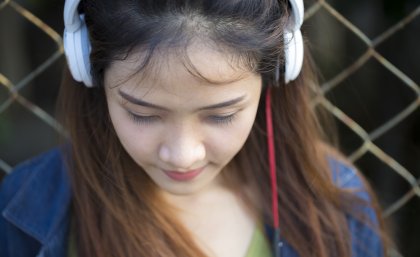
Imagine receiving homework where the task is to “find a high-energy, pleasant song to share next week” and the goal of the subject is to achieve happiness.
University of Queensland School of Psychology researcher Dr Genevieve Dingle has been road-testing an intervention for adolescents exactly like that – with encouraging results.
“We’ve been testing the effectiveness of Tuned In, a program which uses music selected by the participants to evoke a range of positive and negative emotions,” Dr Dingle said.
“It encompasses sessions where the focus is emotional awareness and regulation skills, including psychological theory about music’s relationship to emotion.
“Adolescence is a time of growth, change and emotional upheaval, during which the capacity for self-regulation of emotion is still developing.”
The program was evaluated across two samples of adolescents, a group of 41 at-risk participants (76 per cent males) attending an educational reengagement program and a group of 216 female students at a mainstream Brisbane school.
Using a scale of one to seven (one representing ‘never true’, seven representing ‘always true’), participants answered a series of questions before and after the program.
“The findings of our study showed evidence Tuned In helped build emotional awareness and regulation among both at-risk and mainstream adolescents,” Dr Dingle said.
“For the at-risk group, the most significant change we saw was their reported confidence in managing their emotions over the course of Tuned In.
“We also saw significant increases in the number of participants identifying as emotionally aware and their ability to name emotions.”
The mainstream group indicated they were least confident in managing anxiety before the program.
According to Dr Dingle, this is consistent with what schools have been reporting about anxiety in relation to academic performance and social situations.
“The students were significantly more confident in managing anxiety, sadness and anger after participating in the program,” she said.
“Just as pleasing, the vast majority of the students reported that they thoroughly enjoyed Tuned In and were highly likely to recommend it to others.”
Both the at-risk and mainstream group indicated they would continue to use music after the program concluded to manage emotions.
UQ PhD candidate Joseph Hodges and Masters in Clinical Psychology graduate Ashley Kunde collaborated with Dr Dingle on her research, which has been published in Frontiers in Psychology.
Media: Dr Genevieve Dingle, g.dingle@psy.uq.edu.au, +61 7 3365 7295; Robert Burgin, r.burgin@uq.edu.au, +61 7 3346 3035, + 61 0448 410 364.










